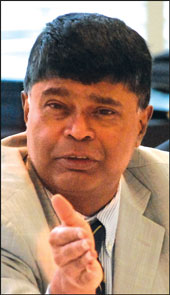The reasons for the ‘resolution’
Q: Why do you believe a number of
Western nations are so determined to pursue a resolution against Sri
Lanka at the HRC meeting?
A: I don’t believe a
number of Western nations are determined, it seems this time round to be
largely the United States (whereas in 2009 it was mainly Britain, with
France tagging around - though Kouchner later I was told granted to his
much more sensible Ambassador here that the latter had been right).
Though the British will end up supporting any American initiative as
they generally do, and other Europeans will probably follow, I believe
that most of them are not too enthusiastic, and in at least some cases
such a decision would I believe be contrary to advice given by
ambassadors on the ground here. You can see the difference in the
initial reactions to the LLRC report, where the Americans were really
quite preposterous, given their own record, while others, including the
British, were much more nuanced.
|

Prof. Rajiva Wijesinha, MP |
As to why the Americans are in an extreme position on this one, I
believe there are several reasons involved, beginning with what a
Republican friend told me, that the Bleeding Hearts in the Obama
administration had to do a volte face on Afghanistan and Iraq etc. and
so they salve their consciences with Sri Lanka. Then there is the
essentially Manichaean American view of the world, which is why for
instance during Cold War days, when they found a willing warrior here in
the form of President Jayewardene, they encouraged his anti-Indian
postures. Now, given their fear of China, they are trying to suggest
that they are supporting India by pressurizing Sri Lanka, whereas the
Indians know perfectly well that, if they got a better offer, they would
sell India down the river, as happened with Pakistan earlier on.
Campaign contributions may also have a part to play. Four years ago,
the LTTE fronts in the US circulated requests to contribute to Hillary
Clinton's campaign, explaining that she was certain to win. That’s why
we were quite glad when Obama won, but I suppose credits are
transferable, and in an election year I suppose you don't want to leave
any stone unturned, whatever is crawling about under it.
And there is still the old view, which even some Europeans have put
to me, that a change of regime would be better for Sri Lanka.
When this led to support for Sarath Fonseka, one was reminded of the
Anglo-Saxon support for Idi Amin, but I suppose people believe what they
want to believe, and Americans are adept at swallowing six impossible
things before breakfast.
Q: What measures is Sri Lanka taking
to prevent this happening?
A: I do not know because I
am not familiar now with the workings of the Ministry of External
Affairs, my links dating back to the days of our former Ambassador in
Geneva Dayan Jayatilleka. He managed to avoid any resolutions against
Sri Lanka, even though the British Ambassador in Geneva (a former child
soldier as I used to think of him called Nick Thorne) kept threatening
them, simply by engaging actively with all the different groups in
Geneva, and keeping them abreast of what was happening.
I believe the present Ambassador is employing the same open
technique, which will I hope be successful, but in between we seemed to
follow Western advice, and we tended, as an Indian journalist told me,
to only think about the rest of the world when we wanted a vote, without
consulting and taking on suggestions. We should certainly take friendly
advice, while also explaining what we have done and what we plan,
because discussing things with friends will help us to fine tune our
activities as well as our responses.
Q: Does the Sri Lankan government
intend to implement the recommendations of the LLRC report? If so, when
might those steps begin?
A: Yes, and they have
begun already. Unfortunately we are hopeless about letting the world
know what we are doing. To give you a typical example of what I can only
describe as the sheer carelessness of our decision makers, we waited
until after American diplomats had come to Sri Lanka to wag their
fingers at us to announce that we had begun inquiring into incidents
where there seemed to be a prima facie case with precise details. The
inquiries had begun in fact soon after the LLRC report came out, as I
found out when I asked the Army Commander a month ago what was
happening. I advised him to publicize the fact, but of course no one
ever takes my advice seriously, so we have to suffer the ignominy of
international and even national reporting that claims we instituted an
inquiry in response to American pressure.
Similarly, the LLRC made some interim recommendations in 2010, which
the President was under the impression were being implemented
systematically.
In fact they were being implemented, but the Committee appointed to
oversee this did not function coherently, which meant that positive
measures were not reported clearly, while lacunae were not identified
and dealt with swiftly.
We certainly need to do better now, which is why I have been
advocating the establishment of a Ministry of Reconciliation, headed by
a Senior Minister, who could coordinate the activities of the various
Ministries that need to work on this.
We are now doing something of the sort with regard to the Human
Rights National Action Plan, which was approved by Cabinet some months
ago, but which only now has a Task Force to ensure implementation.
As an international journalist friend put it, we are ‘too casual/lazy
about communicating what has been done’, which is essential not only to
make clear our commitment, but also, so that we ourselves can see what
more needs to be done. |



